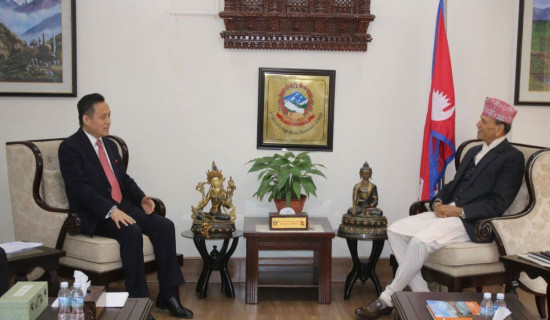- Wednesday, 25 February 2026
IT Transforms Media Landscape
The communication sector has developed by leaps and bounds in the past few decades. It has taken a bigger and a longer leap forward with the development of newer technologies and new innovations in recent times. Naturally, the media sector has also grown to unimaginable heights because of the progress seen in newer technologies and also with the liberal and supportive attitude of the democratic governments the nation has seen.
First, let us talk about the development of newer technologies for the progress made by the country. There was a time when just making a simple phone call, especially, to communicate with people in far off areas of the country and also in foreign soil, needed much effort and a long time as well. For doing this at present, has become a very simple task. The older type of time consuming communication system, has been completely ended and now virtually most Nepalis have a mobile phone in their hands and they can reach friends and family members within the country and some who are in the far corners of the world, easily.
Connectivity
Then there was a time, when it took years to get a phone line. But now, the telephone companies are engaged in hectic efforts to attract phone users to connect with their services by giving attractive bargains and lucrative offers to them. There is no doubt that communication contributes in a very significant manner in fulfilling the development goals of any nation, especially a country like Nepal, which has a difficult terrain and lack proper roads connecting the remote areas to more well-off cities and municipalities within the country, which have better facilities.
The present and past governments have recognised the importance of better communication in all sectors for the rapid growth of the nation. But the innovation of newer technologies and access to the internet have not come without the dangers of security threats for the government and financial institutions and also in making an intrusion into the private lives of individuals, thus bringing social disharmony. The misuse of the easy reach through the personal connections in the social sites of people who are not aware of being exposed without their knowledge, is also rampant.
Therefore, the seriousness with which the present government has taken to make aware the people and at the same time also introduce strict laws for the proper use of the newer technologies, is encouraging. It is necessary to make proper use of the new information technologies and also in the drafting of proper rules and regulations by the government, to control the misuse of the same. This has been reflected in the government's plans and programmes, which have already been implemented and also other regulations that are in the pipeline for the future so that the information technology is developed and used in a right manner without it being a threat to national security and social unity.
Like mentioned already before, the development in newer information technology has also come as a boon for the media sector all over the world and in Nepal also. Having been actively involved in the media sector for over four decades, this scribe remembers working at one time, when all newspapers were printed through the 'hand compose' method in which a trained composer would string up metaled letters, to make a word and then put them together to make a sentence. This was a work which had to be done with much concentration and these sentences were finally put in a metal holder which would be fitted to a 'hand press' run by men who pedalled the machine. This was a time consuming and difficult work.
Gorkhapatra Corporation was the first publishing house, which introduced the then 'photo compose' method and electrically run presses in the country. This made the work much easier for publishing newspapers and other publications. We must remember that this was the time when there were no TV channels and the many FM radio stations we see now. As the years went by, teleprinters started to come into use and then scanners and later the recently developed digital method, which help people all over the world to not only get news and other information, but also for online shopping, transferring money, ordering household needs and even food through a mobile phone and so on.
Digital technology
In fact the present use of digital technology has brought some sort of a revolution in the IT sector and also helped in the efforts of many countries to move more rapidly ahead and save time as well. But towards the end, there still is the question of the sprouting of so many media outlets and whether it has been good or not for the country and the media industry. Unhealthy competition in the market and news not being credible have made a huge dent in the faith the common people had in the media.
The people working in the media should first be themselves alert that news with partisan interests or defaming well-known individuals, must not be printed or broadcast in the name of 'free press'. This will be damaging for the whole media world which has worked so diligently for democracy and also for the freedom of expression which are vital assets for any democratic system. For this to happen, we need more professional and not partisan media workers, so that they play a significant role for a democratic society, a strong economy and stable society, which all the people in this country want.
(The author is former chief editor of this daily.)














-original-thumb.jpg)

